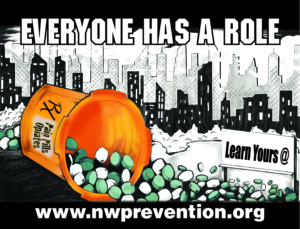Everyone Has a Role To Curb Opioid Epidemic
Seven-county collaborative on the front lines of crisis
By Claire Stuart
Unfortunately, there is probably no one who does not know of someone who has been touched by the opioid/heroin epidemic, be it a family member, friend or associate.
Christa Shifflett, executive director of the Warren Coalition, part of the Northwestern Prevention Collaborative, has been working in drug prevention for over 20 years, ten with the Warren Coalition. “I was working in West Virginia when the opioid crisis started,” she recalled, “and West Virginia was ground zero. By the time the field figured out what was going on and how bad it was, we were five or six years behind what was already started, and there was nothing—absolutely nothing—no materials. It had a lead on us before the field started reacting to it.”She traced the beginning to around 15 years ago, first with easily-available pain pills and then to an explosion in heroin use around 2006–07 in West Virginia’s Eastern Panhandle.
She went on to report that Northwestern Virginia saw its first opiate overdose death in Warren County in 2012. “But they had pain pill issues before that.” Northwestern Prevention Collaborative partners Northwestern Community Services Board with four substance abuse coalitions, representing Winchester/Fredrick/Clarke counties, Page, Shenandoah, and Warren counties, with Warren Coalition as the lead agency.
The goal is to combine prevention and treatment and reduce heroin/prescription drug overdose deaths. Northwestern Community Services is the fiscal agency and supplies prevention services. “We have three different grants we’re working on with this collaborative,” Shifflett explained. “The first is through the Virginia Department of Behavior Health and Developmental Services. It is a strategic prevention framework grant that addresses the opioid crisis.” This includes distribution of both useful and educational materials. “We have lock boxes for people to put their medications in,” said Shifflett, “and we have timer tabs to go on your medicine to tell you when the bottle was opened so you don’t take your pills too soon, or you can tell if someone else has been in your pills.” They also have Deterra drug disposal bags. She explained that you can put expired or unused meds in the bag, add water and shake. The drug is deactivated and transformed into an inert substance that can safely be discarded in the trash and cannot hurt the water supply. Posters and rack cards are available for doctors’ offices with lists of all the legal opioids that exist, pictures of the pills, and symptoms of overdoses.
There are also lists of all the medicine drop boxes in the communities. If you have unwanted meds that you would like to get out of your house, you can drop them there. “It’s important that people get rid of surplus pills,” Shifflett cautioned. “People will break into your house. You don’t want to put in an obit that someone died of cancer, because people will know there were pain pills in your house and break in during the funeral!” She added that it is also important not to leave prescription pills in the house if you are having a real estate open house. “Take your pills with you! Same, if people are coming in to do work. The pills are worth a fortune on the street.” Training is being offered to make people aware of signs of opioid overdose and the use of Naloxone (Narcan), an opioid overdose treatment that is now available in Virginia without a prescription. “We are now targeting restaurants and convenience stores,” said Shifflett. “I work with the regional jail a couple of days a week. When I ask people who struggle with opioid use disorders where to have Narcan available, they say restaurants and convenience stores. People use drugs in bathrooms and have overdoses in there.”
The Coalition is running a big drug prevention campaign right now called “Everyone Has A Role.” They are rebuilding their web site, with different sections describing what your role can be in helping. “As a part of that, we have a series we’re now using with peer support specialists,” said Shifflett. “These are people in recovery. We asked them a lot of questions—the questions that people ask most—how they got started, how old were they when they started, the importance of Narcan training, importance of locking up your meds, because that’s how they got started.” There will be billboards pointing to the web site and brochures listing all the materials they have to give away. Speakers are available for schools and to train teachers. “Lock up your meds,” she advises. “Talk to your doctor about alternatives to opioids because you could get addicted. In the last probably two months, I’ve given away 450 lock boxes. That’s just me, personally. We really want to get them out in the community so that we can turn the faucet off on these pills.” For information on what you can do, visit the web site: www.nwprevention.org.










